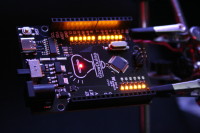GlowDuino Uno


A better version of the well-known Uno board. Now with a bunch of LEDs, USB C, Switchable I/O level, and more power. All in a well-designed package that is compatible with the original Arduino Uno
Description:
-----------------
A fully Arduino IDE-compatible microcontroller. The first one in the possible future GlowDuino lineup. Based on the Atmega 328PB, it is pin-compatible with the original Arduino while offering more pins and more functions than a regular Uno board while being backward compatible with existing designs. It offers 24 input/output pins, of which 8 can be used as analog input and 9 as PWM output.
Our goal is to make our designs based on the needs of the users. The GlowDuino Uno offers 1A power output on the 3.3V and 5V lines so you can connect more things up to your board. To help you with connection issues, each standard pin has an indicator LED, so you don’t have to measure to find where the problem is. For ease of use, you can power the board with USB C or with 6 to 20V through the power jack. In case you are using 3.3V-only attachments, you can change the output voltage with a flick of a switch.
Why on Elektor?
-----------------------
We would like to see the reaction of the makers to our idea, and what is a better way than to post it here? The GlowDuino Uno is in very limited production and available on https://www.glowduino.com/ just to see some feedback from those who might buy it. But feedback from those who see it is also important, hence this project on Elektor. We would like to expand this microcontroller family with similar boards in the future, but we need to start small for that to happen. So all and every feedback is appreciated, be it comment, addition, or criticism.
Specifications:
---------------------
Documentation:
----------------------
As with almost every design in the maker community, GlowDuino is open-source. Visit our GitHub page for more info about the Uno board:
https://github.com/GlowDuino/GlowDuino
Pin differences:
---------------------
Every pin with an indicator LED has a pull-down resistor with a value of 665 kilo ohms. This means these pins are not floating pins. In our testing, this does not interfere with analog or digital measurements and causes no disturbance when using capacitive touch sensing. However, you will not be able to use such an analog pin for nondeterministic operations, such as random number generation. For these purposes, you can substitute these pins with either the A6 or A7 analog pins, which do not have pull-down resistors and as such are considered floating pins.
-----------------
A fully Arduino IDE-compatible microcontroller. The first one in the possible future GlowDuino lineup. Based on the Atmega 328PB, it is pin-compatible with the original Arduino while offering more pins and more functions than a regular Uno board while being backward compatible with existing designs. It offers 24 input/output pins, of which 8 can be used as analog input and 9 as PWM output.
Our goal is to make our designs based on the needs of the users. The GlowDuino Uno offers 1A power output on the 3.3V and 5V lines so you can connect more things up to your board. To help you with connection issues, each standard pin has an indicator LED, so you don’t have to measure to find where the problem is. For ease of use, you can power the board with USB C or with 6 to 20V through the power jack. In case you are using 3.3V-only attachments, you can change the output voltage with a flick of a switch.
Why on Elektor?
-----------------------
We would like to see the reaction of the makers to our idea, and what is a better way than to post it here? The GlowDuino Uno is in very limited production and available on https://www.glowduino.com/ just to see some feedback from those who might buy it. But feedback from those who see it is also important, hence this project on Elektor. We would like to expand this microcontroller family with similar boards in the future, but we need to start small for that to happen. So all and every feedback is appreciated, be it comment, addition, or criticism.
Specifications:
---------------------
- Chip: Atmega 328PB
- Clock: 16MHz
- Memory: 32k
- SRAM: 2k
- Max 5V current: 1A
- Max 3.3V current: 1A
- I/O current: 40mA
- I/O pins: 24
- Analog inputs: 8
- PWM outputs: 9
- UART lines: 2
- I2C lines: 2
- SPI lines: 2
- Timers: 5
- USB connector: Type-C
- I/O voltage: 5V/3.3V changeable
Documentation:
----------------------
As with almost every design in the maker community, GlowDuino is open-source. Visit our GitHub page for more info about the Uno board:
https://github.com/GlowDuino/GlowDuino
Pin differences:
---------------------
Every pin with an indicator LED has a pull-down resistor with a value of 665 kilo ohms. This means these pins are not floating pins. In our testing, this does not interfere with analog or digital measurements and causes no disturbance when using capacitive touch sensing. However, you will not be able to use such an analog pin for nondeterministic operations, such as random number generation. For these purposes, you can substitute these pins with either the A6 or A7 analog pins, which do not have pull-down resistors and as such are considered floating pins.



Discussion (1 commentaire(s))